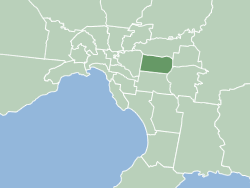City of Whitehorse
|
City of Whitehorse Victoria |
|||||||||||||
|---|---|---|---|---|---|---|---|---|---|---|---|---|---|

Map of Melbourne showing City of Whitehorse
|
|||||||||||||
| Population | 151,334 (2011 census) | ||||||||||||
| • Density | 2,365/km2 (6,120/sq mi) | ||||||||||||
| Established | December 1994 | ||||||||||||
| Area | 64 km2 (24.7 sq mi) | ||||||||||||
| Mayor | Cr Andrew Munroe | ||||||||||||
| Council seat | Nunawading | ||||||||||||
| State electorate(s) | |||||||||||||
| Federal Division(s) | |||||||||||||
 |
|||||||||||||
| Website | City of Whitehorse | ||||||||||||
|
|||||||||||||
The City of Whitehorse is a local government area in Victoria, Australia in the eastern suburbs of Melbourne. It has an area of 64 km2 (25 sq mi) and at the 2011 Census, Whitehorse had a population of 151,334.
Whitehorse was formed in December 1994 by the amalgamation of the former Cities of Box Hill and Nunawading. The name Whitehorse came from the White Horse Inn, a tavern originally located in the area in the late 19th Century. This name was applied to the major thoroughfare, Whitehorse Road, which runs through the municipality today.
In the original proposals for council amalgamations in Melbourne, Whitehorse was a suggested name for an area comprising the City of Box Hill, with the addition of residents east of Union Road (part of the old City of Camberwell). The affected residents were unhappy, believing an alignment with Box Hill would lower the value of their properties. A second proposal featured the current boundaries of Whitehorse. The City of Nunawading proposed the name "City of Koornung", claiming it was more appropriate, as both cities shared the Koonung Creek, but unfortunately they failed to note they had spelled Koonung incorrectly in their proposal. Another suggestion was "City of Deakin", as the region of Whitehorse contains both the Federal electorate of Deakin, and the Melbourne campus of Deakin University, in Burwood.
Other locally recognised names for regions in the city include:
Former names within the region:
Whitehorse has five two-councillor wards – Central, Elgar, Morack, Riversdale and Springfield. Council elections are conducted by postal voting and votes are counted using proportional representation. Voting is compulsory for residents who are on the electoral roll for state elections, but voters aged 70 years or over are not obliged to vote at local council elections. The Mayor is elected by the Councillors at the first meeting of the Council for a term of either one or two years, at the end of which a Council meeting is held to elect the Mayor for another fixed term. The most recent election was held in October 2012, and the makeup of the Council is as follows:
...
Wikipedia
